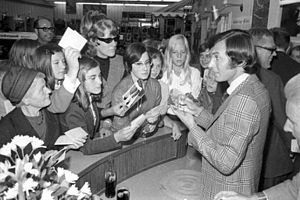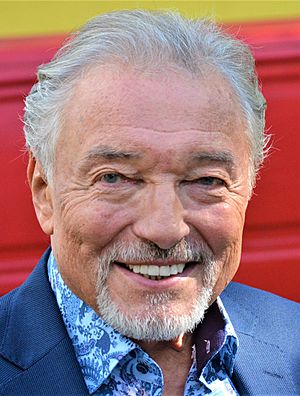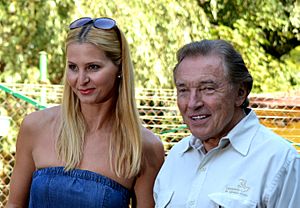Karel Gott facts for kids
Quick facts for kids
Karel Gott
|
|
|---|---|
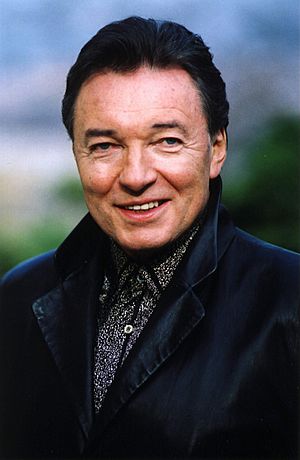
Gott in 2002
|
|
| Background information | |
| Also known as | Golden voice of Prague (Czech: Zlatý hlas z Prahy) Sinatra of the East (Czech: Sinatra Východu) Divine Charlie (Czech: Božský Kája) |
| Born | 14 July 1939 Plzeň, Protectorate of Bohemia and Moravia |
| Died | 1 October 2019 (aged 80) Prague, Czech Republic |
| Genres | |
| Occupation(s) |
|
| Years active | 1958–2019 |
| Labels | |
Karel Gott (born July 14, 1939 – died October 1, 2019) was a famous Czech singer. Many people considered him the most successful male singer in Czechoslovakia and later in the Czech Republic. He won the Český slavík (Czech Nightingale) award for best male singer 42 times. This national music award is very important in his home country. His last win was in 2017.
Karel Gott also became very popular in countries where German is spoken. There, people called him "the Golden Voice of Prague." He won the Goldene Stimmgabel award three times in 1982, 1984, and 1995.
During his long career, he released over 100 albums and 100 collections of his songs. He sold an amazing 50 to 100 million records around the world. About 23 million of these were sold in German-speaking countries. Another 15 million were sold in Czechoslovakia and its new countries, the Czech Republic and Slovakia.
Contents
Karel Gott's Early Life
Karel Gott was born in Plzeň (then called Pilsen) in what was known as the Protectorate of Bohemia and Moravia. Today, this place is Plzeň in the Czech Republic. When he was six years old, his family moved to Prague.
Karel first dreamed of becoming an artist and studying art. However, he did not pass the entrance exams for the Academy of Arts, Architecture and Design in Prague. So, he decided to train as an electrician instead. After finishing his studies, he started working as an electrician. But he also became very interested in the music scene in Prague, especially jazz. He tried playing the bass and the guitar. In the end, he decided to focus on singing and took private lessons. During the 1950s, he sang as a hobby and often joined singing contests.
Starting His Music Career
In 1958, Karel Gott took part in a singing contest called "Looking for New Talent." He didn't win, but he did get his first chance to perform at the Vltava Prague Cafe that same year.
In 1960, he decided to become a professional singer. He studied opera at the Prague Conservatory. His teacher, Konstantin Karenin, taught him both classical Italian songs and popular music. Around this time, Karel Gott traveled outside his country for the first time. He went to Poland with the Czechoslovak Radio Jazz Orchestra.
In 1962, Karel Gott released his first song with Supraphon. It was a duet with jazz singer Vlasta Průchová, called Až nám bude dvakrát tolik (When we are twice as old). That year, he appeared in the first Zlatý slavík (Golden Nightingale) national poll. He placed 49th with only three votes. Soon after, in 1963, Gott left the conservatory. He continued taking private singing lessons until 1966.
In 1963, Karel Gott got a spot at the new Semafor Theater. This theater was a big part of the new pop music scene in Czechoslovakia. This was his first important experience performing on stage. In the same year, he released his first solo song. It was a Czech version of Henry Mancini's Moon River. After that came his song Oči sněhem zaváté (Snowdrift Eyes), which became the best-selling record of the year. Soon, Gott received his first Zlatý slavík award. He would go on to win this award 41 more times!
Karel Gott started the Apollo Theater in 1965 with two friends from Semafor, Jiří and Ladislav Štaidl. By this time, he was already well known to the public. He appeared in popular TV shows and built up his own collection of songs with his orchestra. He also started writing his own songs. He toured Czechoslovakia and other countries with the Apollo Theater. That year, he released his first album, Karel Gott Sings, with Supraphon. He also released an English album called The Golden Voice of Prague.
In 1967, Gott performed at Midem, a big music industry event in Cannes, France. His performance was very impressive. After this, Gott signed a contract with the Polydor record company. He renewed this contract many times, and it became a lifetime contract in 1997. Between 1967 and 2000, Polydor released over 125 albums and 72 singles for Karel Gott in German-speaking countries. Gott also represented Austria in the Eurovision Song Contest 1968 with the song Tausend Fenster. He finished in 13th place. In the same year, Gott spent six months performing every night in Las Vegas.
Success in the 1970s
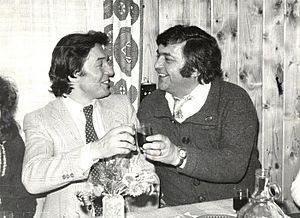
In the 1970s, Karel Gott became even more successful in his home country. He appeared regularly on television, including a ten-part show called Karel Gott in Slany. In Germany, which was one of his most important markets, he became a big star in 1970 with his song Einmal um die ganze Welt. He was popular in both West and East Germany. He often appeared on TV shows like the ZDF-Hitparade.
One of his most famous songs was the theme music for the animated film series Maya the Honey Bee. He recorded this song in German, and later in Slovak and Czech for the versions of the show in those languages. On May 3, 1977, he was given the title of Merited Artist. The next year, he received the Golden Hat of Cologne award. His first album in the Soviet Union, released in 1977, sold over 4.5 million copies. He is still popular in the countries that used to be part of the Soviet Union.
Towards the end of the 1970s, Gott started trying out different types of music. These included country music and classical songs. He performed at the Fan Fair Country Music Festival in 1979, which was the first of five times he would appear there.
International Fame and Farewell Tour
The 1980s brought Karel Gott even more international success. In 1981, he filmed a musical called In the Track of Bel Canto in Italy. He also released a German-Italian album and performed a duet with Sofia Rotaru in the Soviet Union. In 1983, Gott received the Gold Medal of Hermann Löns in Munich, Germany. This was for his help in developing German traditional songs. On April 30, 1985, he was given the title of National Artist for his amazing artistic work. In 1986, to celebrate 20 years with Polydor, he received the company's Golden Needle award. Only famous musicians like Leonard Bernstein and Herbert von Karajan had received it before him. In March 1991, he was the first artist to be added to the Hall of Fame of the Academy of Popular Music. On September 8, 1992, he received the Supraphon Diamond Record Award for selling 13 million records in Czechoslovakia.
In 1990, Karel Gott announced that he would stop singing and planned a long farewell tour. However, the tour was so successful that he changed his mind! In 1993, he started his own artistic agency called GOJA with František Janeček. This agency now produces Gott's records and manages his music activities.
Comeback and Later Years
In 1996, people became very interested in his career again. Karel Gott won the Český slavík (Czech Nightingale) award once more. He continued to win this award every year after that, except for 1998 and 2012. He remained popular in many countries and performed widely outside the Czech Republic. On September 29, 2000, he performed a concert at Carnegie Hall in New York City.
In 2008, he appeared on the rapper Bushido's album Heavy Metal Payback. They sang a duet called "Für immer jung," which was a cover of "Forever Young" by Alphaville.
In 2009, the Czech state gave him a Distinguished Merit Medal. His German lyricist from 2001 was Filip Albrecht, who wrote over 20 songs for him. In May 2014, Gott released his autobiography called Zwischen zwei Welten (Between two worlds).
In May 2019, just a few months before he passed away, Gott released his last song and music video. It was a duet with his daughter Charlotte called "Srdce nehasnou" (Hearts don't fade). When the song came out, Karel Gott's health problems were kept a secret. But after he died, the songwriter Richard Krajčo said he was asked to write the duet very quickly.
Personal Life
Karel Gott had two older daughters, Dominika and Lucie, from previous relationships. He married his last wife, Ivana Macháčková, in January 2008 in Las Vegas. They had two daughters together, Charlotte (born in April 2006) and Nelly (born in May 2008).
During the 1990s, Gott started to focus on painting. His first art show was in 1992, at the Prague Christ Child Gallery. His paintings were also shown in Berlin, Moscow, Munich, Cologne, Vienna, and Bratislava.
Health and Passing Away
In October 2015, Karel Gott was diagnosed with cancer of the lymph nodes. On March 18, 2016, news reports said that he had beaten the cancer. However, in September 2019, he developed acute leukemia. Because of this, he had to cancel all his upcoming performances and started treatment. He passed away at his home in Bertramka on October 1, 2019, at the age of 80. His family was with him.
All major TV stations in the Czech Republic announced his death with breaking news and special programs. Czech Radio and Radio Impuls also changed their schedules. The government decided to hold a funeral with state honors and declared the day of the funeral a national day of mourning.
A public ceremony was held on Friday, October 11, 2019, at the Žofín Palace in Prague. Fans traveled from all over the Czech Republic and Germany. They waited for many hours in a five-kilometer line to enter the palace. The ceremony ended at midnight, and about 49,000 people had come to pay their respects. The funeral mass with state honors took place at Saint Vitus Cathedral on Saturday, October 12. Many famous Czech singers, actors, and sports figures attended, along with President Miloš Zeman and Prime Minister Andrej Babiš.
Discography
See also
 In Spanish: Karel Gott para niños
In Spanish: Karel Gott para niños
- Neznámy pár – a duet with Marika Gombitová
- Hrajme píseň – a trio with Marika Gombitová and Josef Laufer
 | Claudette Colvin |
 | Myrlie Evers-Williams |
 | Alberta Odell Jones |


